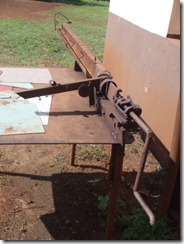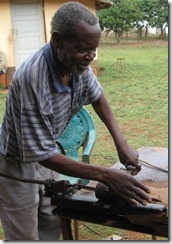By Brian Deyo
Babe wetfu was a gentle man who I yearn to have known better. When we first arrived at site my unease of what my next two years would be like was palpable. Within days it was clear that Babe’s company would make me happy for the homestead to which we have been delivered. One day early in integration, Babe looked up at me and said, “Majaha, why did people stop going to the moon?” I was excited that one day I might be able to show off pictures of the moon, distant galaxies and all points in between.
Regrettably, I was ne ver afforded my chance to satisfy his curiosity about so many things. Our babe suffered daily from a stroke he had a few years before we came. This left him in a much weakened condition and he wasn’t able to get around much. At the age of 72 he was fighting the good fight against time, but was unable to fend off his physical ailments.
ver afforded my chance to satisfy his curiosity about so many things. Our babe suffered daily from a stroke he had a few years before we came. This left him in a much weakened condition and he wasn’t able to get around much. At the age of 72 he was fighting the good fight against time, but was unable to fend off his physical ailments.
When we awoke to the new of Babe’s passing, our entire service was frozen in time. What should we do? Do we go hug our make? Do we give money? Our immediate thoughts were to find out from our incredibly patient Swazi staff what our next step should be. I asked babe Musa 20 questions before I ran out of breath and paused long enough to let him respond. Very succinctly he asked, “Is it difficult for you right now?” We had called looking for some help with Swazi tradition, and what we received was warmth and understanding that helped bring our world a little closer to “normal.”
Peace Corps didn’t waste any time taking action. The day was April 19th and was a Swaziland national holiday. Within a few hours of the phone call we were being picked up from our home and were taken to Mbabane. The car ride provided enough time to reflect a bit and try to start the difficult process of understanding what comes next. I’m sure by the end of the drive back home I asked the same questions five more times. Although we could have stayed put if we had insisted, they let us know that the family would be making incredibly difficult decisions for a few days, and that our time away would let the family concentrate without having to make sure we were doing ok. Thanks again to Day, babe Musa, and babe  Mfanafuthi for their incredible patience and understanding.
Mfanafuthi for their incredible patience and understanding.
After two days in the capital and a basic understanding of what was to come, Krista and I agreed that I would come back to site and she would come in time for the memorial service. I was briefed during this time that Peace Corps would come out and pay their respects to my family. The morning I was to return home babe Vilikati, babe Malaza, babe Ndzabandzaba, and make Mkhabela all jumped in the car! It was an honor to have so many of the PC family bring me back. They explained to me what I could expect over the next several hours, and the following days leading to the service. And when we arrived, the staff and I went into indlu yagogo and prayed. My host family sang and my Peace Corps family joined them. They passed condolences onto the family and thanked them for everything they did for us. I am still unable to convey completely my sincere thanks to the staff for their coming.
All during the time we were in the gogo hut, the household was a flurry of activity. Bomake and bosisi were cooking and cleaning mass amounts of food. Bobhuti were helping clean the homestead to prepare for company. After I exited the hut and Peace Corps departed, I immediately found myself absorbed into the work at hand. I put a door on the maize shelter, cleaned the yard, helped paint, and learned how to glaze windows. I was told the hardest work would be on Saturday as the tent needed to be erected, and the grave needed to be dug.
Since I’ve talked about my experience over the last month, I have heard other people’s experiences when a member of their family has passed. My experience has been vastly different from every account I have heard. As we build our relationships with our friends and family here, each of our experiences are personal, and will be different from other PCVs. At the end of the day each of Peace Corps experiences is our own, and we will all come away with incredibly different stories of living the both good times and the bad.
Our babe had been suffering for many years, and was particularly bad over the last several weeks. Although the family was necessarily sad, there was an air of relief around the end of his suffering. There was more laughing and smiling than I anticipated. We played cards and told jokes. The children danced and sung loudly. I met many new family members and strengthened existing relationships.
While we were digging, the process was to grab a digging tool and prepare to be made fun of. Although I speak SiSwati fairly well, I could not follow the insults and teasing coming from the gallery of onlookers. The task was to poke as much fun as possible at the person digging, until they broke out in laughter and couldn’t dig any further. It seemed the direct opposite of being teka’d. Standing under the starry dark sky with 20 bobhuti and only a Nokia phone as a flashlight, we dug. Staring at the stars, I closed my eyes and focused on the laughter, spirit and camaraderie of the men around me. It was in this moment that I felt the closest to my family and community.
The night vigil and subsequent funeral in the morning was as anticipated. The tent became a habitat for bogogo and bomkhulu from as near as next door, to as far as Zimbabwe. It served well through the windy Lomahasha night, and only partially crashed down the next morning. People prayed and sang throughout the evening, interrupted only by full meals, followed by tea breaks. In an effort to discourage this potentially health-affecting practice, Krista and I did the night vigil in shifts. I was up until midnight; she awoke at 3am.
After the entirety of the previous week, I was told that our make was not to leave the house for 30 days and 30 nights, all the while cloaked in black. It is culturally appropriate for women to see and talk with a mourning wife, and inappropriate for men to do the same. It was during this time that I was not to see her or speak to her, as I was not “family.” I was later told the origin of the 30 days in the hut was born out of necessity. Before motorized transportation, it would take days or weeks for the news of a death to reach distant family. It would then take days or weeks for the family to come visit. Having the widow stay in one place guaranteed those traveling would find the person upon arrival. Although mobile communication and better transport have bridged this gulf with time, the tradition of staying in the hut is still alive.
As time went on, Make began joking with Krista about how “Majaha is afraid of me.” I would run around the homestead shielding my eyes and screaming loudly so she could know my location at all times. On day 29 make told I shouldn’t have avoiding her as I am her son. We had our reunion during a prayer service and she told me how my avoidance made her sadder than anything else that happened since Babe passed away. Sometimes I find myself struggling to articulate the warmth I receive from our host family. The only way to understand Ubuntu seems to be through a direct encounter with the serene beauty t hat humanity can emanate.
hat humanity can emanate.
Although our make is not a traditional woman, she has said she will follow the rules and wear black for the next six months or more. When we asked her how she felt on the first official day outside, she chuckled as her eyes shined. She responded to her confinement by saying, “It was killing me.” Our make has survived for 70+ years and seen countless things that I will never know. Life has returned to what it was, and up at dawn I can see make tending to the chickens, and wandering the fields, satisfied at a life well lived.